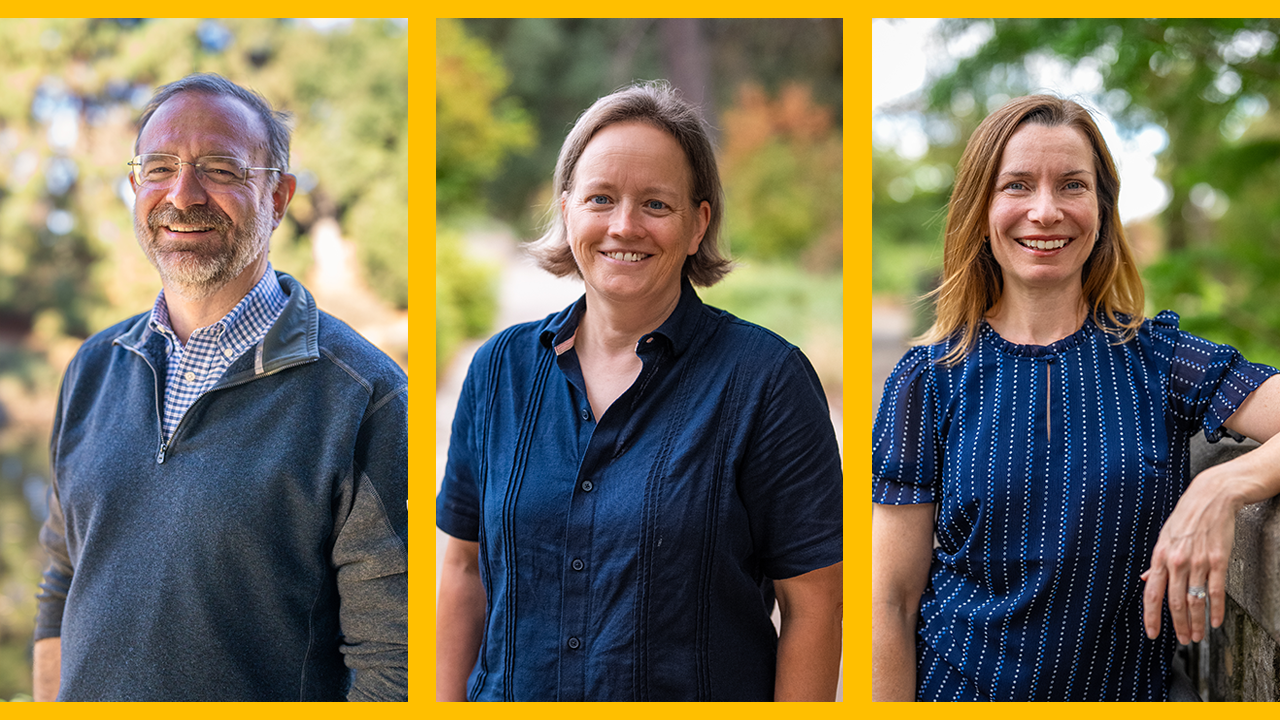
Bond, Guyer, Todgham Appointed to Dean’s Leadership Team
Three professors in the College of Agricultural and Environmental Sciences at UC Davis have taken on new roles on the college leadership team, Dean Ashley M. Stokes announced.
Professor Jason Bond is the new executive associate dean, or EAD, after serving on an interim basis in that position for several months. Professor Anne Todgham is the new associate dean for agricultural sciences and Professor Amanda Guyer is associate dean for human and social sciences.
“Each of them brings a breadth of experience to their roles and will build upon that commitment and leadership to the college,” Stokes said. “I am very excited to strengthen our leadership team with their expertise and dedication.”
Executive Associate Dean
Bond came to UC Davis in 2018 as a professor in the Department of Entomology and Nematology and the Evert and Marion Schlinger Endowed Chair. In 2021 he took on the role of associate dean of agricultural programs and in February 2024 became director of the R.M. Bohart Museum of Entomology.
He served in several key leadership roles, including on the Resnick Innovation Agricultural Fund Committee and planning for the college’s inaugural symposium that is now an annual event.
Bond’s research centers on biodiversity and its relationship to essential ecosystem services; and his most recent work focuses on understanding the impact of global change on biodiversity. He succeeds Anita Oberbauer who retired this summer.
“Our college is the cornerstone of conducting the land grant mission here at UC Davis, and I am excited to serve in the role as EAD, supporting that mission,” Bond said. “Our new Dean, Ashley Stokes, is an amazing leader. Her optimism, wisdom and steady leadership is inspiring, particularly as we navigate and embrace challenges and opportunities ahead.”
Associate dean of agricultural sciences
Todgham, who joined UC Davis in 2013 as an assistant professor in animal physiology, has been chair of the Department of Animal Science since 2021, overseeing the largest undergraduate major in the college and 11 animal facilities.
She is a Chancellor’s Fellow, associate director of academic programs for the Coastal and Marine Sciences Institute and has taken on many college leadership roles.
Todgham is a stress physiologist whose research encompasses agriculture and environmental sciences. Her research focuses on change brought on or influenced by human activity, whether aquatic animals can survive environmental changes and how to improve their resilience in changing climates. She succeeds Bond.
“We are first in the nation and recognized globally as innovative leaders and game changers at the nexus of agricultural, environmental and social sciences,” Todgham said. “I look forward to being in a position where I can highlight our strengths to our external stakeholders, while also listening to understand where we can provide the science needed to help solve grand challenges in sustainable agriculture.”
Associate dean of human and social sciences
Guyer joined UC Davis in 2009 as an assistant professor in the human development and family studies program in the Department of Human Ecology. She was named a William T. Grant Scholar and elected a fellow of the Association for Psychological Science in 2019, recognizing her distinguished contributions to the field in research, teaching and service.
She is a Chancellor’s Fellow, served two terms as chair of the Human Development Graduate Program and is associate director and co-director of the Center for Mind and Brain. She succeeds Patsy Eubanks Owens who retired this summer.
Guyer’s research focuses on understanding the intersection of brain development, mental health risk and sociocultural contexts during the critical developmental periods of childhood and adolescence. She prioritizes studying youth from backgrounds underrepresented in research on how the brain develops.
“Supporting my colleagues, our staff and our amazing students in human and social sciences and helping them reach their goals has always been the most rewarding part of my service, and I look forward to continuing that from this new role,” Guyer said. “While we face transitions and challenges ahead, I see these as opportunities for growth and development.”
Media Resources
- Emily C. Dooley, College of Agricultural and Environmental Sciences, ecdooley@ucdavis.edu
- Caren Weintraub, College of Agricultural and Environmental Sciences, crweintraub@ucdavis.edu